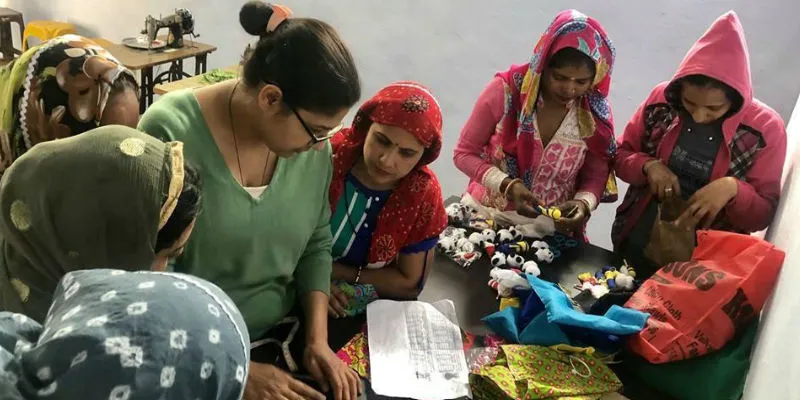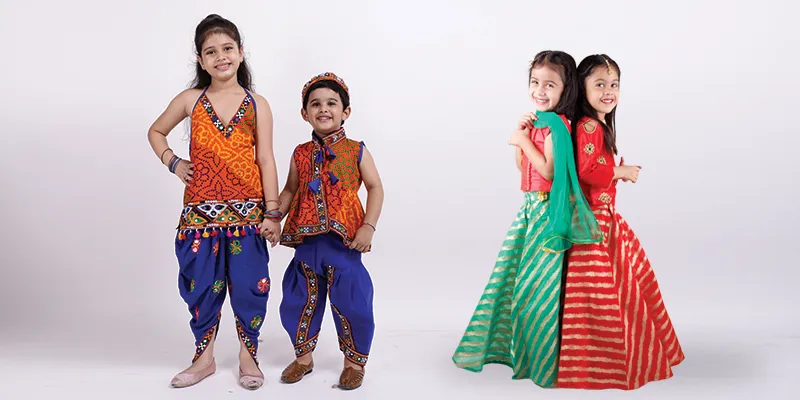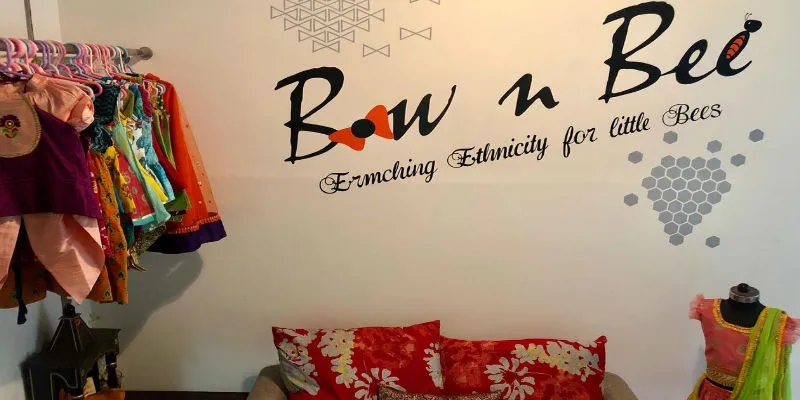From Rs 3 lakh to Rs 3Cr - how Monika Chaudhary quit her corporate job to venture into ethnic children’s wear
BownBee, founded by Monika Chaudhary in 2015, aims to be a one-stop-shop for ethnic children's wear. The startup works with artisans and weavers from different states to maintain the right blend of local flavour and in-house designs in its products.
After 15 years in consulting and business development with companies like GE and IBM, Monika Chaudhary decided to quit corporate life in 2013 to explore new options.
There was no concrete business idea in her mind when she put in her papers at IBM. Her immediate aim was to spend more time with her three-year-old daughter.
But, at the back of her mind, Monika had a concept brewing. She took a lot of pleasure in dressing up her daughter in traditional Indian wear and her quest for the best used to take her to shopping malls often.
However, she found a gap when it came to traditional wear for children, though Indian culture and heritage is rich when it comes to textiles, skilled karigars or intricate designs.
A quick check with her friends corroborated her belief that the ethnic wear segment for children was a huge, untapped market.

Monika Chaudhary founded BownBee in 2015
Designing a startup
In 2015, Monika laid the foundation of her entrepreneurial venture, BownBee from a makeshift office at her home and a seed capital of Rs 3 lakh.
Speaking about picking the name BownBee, Monika says,
“Bow is typically a knot tied around two loose ends, that is what we do! We connect consumers with their needs directly. There are no middle vendors, we are directly selling the products to the customers. And Bee symbolises determination, teamwork and community power. Hence we joined Bownbee together.”
Initially, she procured some custom-made ethnic wear from manufacturers in Jaipur. Her daughter became her first muse and she would make her try on various designs to see how they fit. Soon, the first BownBee collection went live on an online marketplace Hopscotch with 20 products. She also exhibited the products in Gurugram at Unitech Club Patio, South City 1 to understand customers’ feedback.
To her delight, the first week of business brought in 50 orders a day with raving feedback from buyers. The proof of concept was successful. It was now time to hunt for a reliable manufacturer.
A few days of pavement pounding in the markets of Jaipur got her a reliable manufacturer, who continues to be on board. Monika’s first employee was her househelp’s daughter who learned on the job and helped her with packing consignments for delivery.
The business soon grew, and within a year, BownBee clocked Rs 40 lakh in revenue, Monika expanded her team to include three more people, and daily orders doubled.
Monika says that the fast-growing and low cap ecommerce platform seemed to be the right vehicle to market BownBee products.
“We launched our first collection at Hopscotch in August 2015 and later started selling on other platforms like FirstCry, Amazon, Flipkart, Myntra etc. Currently, we are one of the top selling kids ethnic brand on Hopscotch and Firstcry,” she says.
Today, BownBee has a team of 10 across designing, production, warehousing and sales, with 70 percent women on its rolls. They work out of a 1,600 sq ft office in Unitech Arcadia, Gurugram. Its production is outsourced to six units spread across Haryana, Rajasthan, Maharashtra, and Gujarat. The quality checks and distribution is done from its centralised Gurugram warehouse.
Supporting artisans and rural women
Since BownBee’s inception, Monika has been working with artisans and weavers from different states in order to maintain the right blend of local flavour and in-house designs in its products. This production model has provided these artisans with a regular and growing source of income.
Taking the social cause further, BownBee has partnered with a Gurugram-based NGO Navjyoti India Foundation to support rural women in villages in Haryana. These women recently completed their first order of cotton dresses, working from a production unit set up in their village.
The company plans to develop this network further and create a wide range of opportunities for rural women.

Elaborating on BownBee’s social initiative, Monika says,
“Our Navratri Collection is manufactured in a remote village in Gujarat while our Rajasthani Kids Collection is tailored in a village near Jaipur. This has not only helped us bring uniqueness to our collections, but has also provided a regular and constant source of income to these artisans who otherwise depend on competitive local markets to sell their products.”
Wide range of designs
BownBee offers traditional as well as Indo-Western apparel for kids.
“Our Indo-Western range of peplum-dhotis, top-palazzos, and casual shirts is a best-seller. It offers daily wear fusion designs that blends the pep of west with the grace of the east,” adds Monika.

Apart from clothes, the startup also offers accessories for children.
The brand’s latest Kidswear Collection offers a range of rich colours, traditional prints and idiosyncratic silhouettes with a quirky Indian touch. Its first Summer ‘19 collection has used light fabrics, including cotton and muslin, to keep kids cool during summer.
Target audience
BownBee’s target audience includes parents who want to dress up their kids in comfortable yet affordable traditional and fusion wear for special occasions and festivals.
“Our product range caters to both boys and girls between the ages of 0 and 12 years (pre-teens). For occasion wear, parents seek uniqueness in design with affordability and quality assurance, something that is hard to find in this unorganised sector. BownBee is successfully bridging this gap through innovation in design, quality, and differentiated sourcing,” Monika says.
Growth and future plans
While it began as a home enterprise with just 20 products, BownBee has grown to offer over 300 unique products under its portfolio. These items are priced between Rs 500 and Rs 2,500 for both boys and girls.
The company claims that it is growing 100 percent in revenue with healthy gross margins YoY and has been profitable from the first year itself. The growth so far has been funded by profits from the business as well as support from family. On an average, BownBee sells around 5,000 units per month with an average price of Rs 800.

The startup has generated a gross merchandise value (GMV) of Rs 3 crore during FY 2018-19 and Rs 1.45 crore in FY 2017-18. At present, it is on an aggressive 300 percent growth target in FY 2019-20 to close at a GMV of Rs 10 crore.
“We largely sell on Indian ecommerce marketplaces like Myntra, Jabong, Amazon, Hopscotch, and Firstcry, to name a few. We also have a pan India presence through our own website. In the B2B space, we have collaborations with retailers in South India. We also ship to customers in markets like Singapore, Malaysia, Middle East, and the UK. At present, 95 percent of our business is from online channels. We have plans to expand our reach in the offline space soon,” says Monika.
In the next phase of growth, BownBee plans to seek support from angel investors who share its vision and will work as partners. It has Rachna Aggarwal, former CEO of Indus League Clothing Ltd (Future Lifestyle Fashions) as an advisor and mentor on board.
“Having understood this segment well and considering growth rate, we are committed to establish the brand at national and international levels in the coming years,” Monika adds.
(Edited by Rekha Balakrishnan)




1553060844415.jpeg?fm=png&auto=format&h=100&w=100&crop=entropy&fit=crop)





